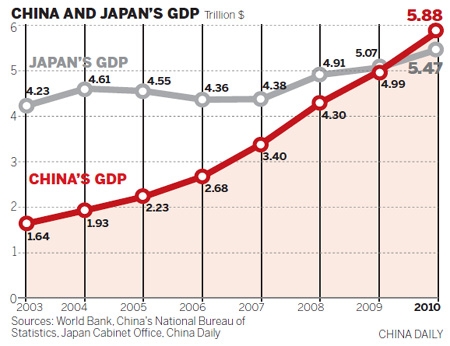Tough road ahead for economy
Updated: 2011-02-18 11:18
By Li Woke, Wang Xing and Yang Yang (China Daily European Weekly)

Rapid economic strides needed for china to sustain growth pace, experts say
China still has a long way to go to improve its economy, despite formally overtaking Japan as the world's second-largest economy, experts say.
Japan's gross domestic product (GDP) reached $5.47 trillion (4.04 trillion euros) last year, compared to $5.88 trillion (4.35 trillion euros) for China, Japan's Cabinet Office said on Feb 14.
Japan became the world's second-largest economy, after the United States, in 1968 on the back of its post-war recovery.
| ||||
"It is not a surprise that China overtook Japan," says Lu Zhengwei, senior economist with the Shanghai-based Industrial Bank.
Meanwhile, Japan's Cabinet Office has predicted that by 2025, China will overtake the United States as the largest economy in the world.
"Based on the two countries' current GDPs, their growth rate and yuan appreciation, it may take 15 years for China to surpass US. It is quite possible that the nation may achieve the feat in 10 years also," says Zheng Chaoyu, a professor with the School of Economics at the Renmin University of China.
"The main problem for China, however, is whether it can sustain the high growth pace. There are challenges in the form of fading labor advantages, aging problems, and shrinking natural resources," he says.
Martin Jacques, visiting research fellow at the London School of Economics Asia Research Centre, believes that the next decade is pivotal for China.
"I think it will be (roughly) 2020 when China overtakes the United States as the largest economy in the world," he says.
"This has been hastened by the financial crisis in the West. I think this will be a very important moment, both materially and symbolically as the US has been the biggest economy in the world since 1914."
Michael Spencer, Asia Pacific chief economist for Deutsche Bank in Hong Kong, believes economic growth in China will continue at 8 or 9 percent throughout the decade and the economy will soon become bigger than that of the United States.
"It will certainly be very close, if China does not exceed the United States over the next 10 years," he says.
However, economists pointed out that China's per capita GDP was only about 10 percent of Japan's.
"We should not overestimate our GDP figure as China's population is 1.3 billion, 10 times bigger than Japan's," said Yi Xianrong, an economist at the Chinese Academy of Social Sciences, a top think tank.
China's per capita GDP was about $4,300 in 2010, and income levels have been falling behind economic growth for years.
Ma Jiantang, head of the National Bureau of Statistics, said in January that the country has a huge population, a weak economic foundation, few resources and many people are mired in poverty.
"Therefore, while we take note of our expanding economic size and strength, we should also soberly understand that China remains a developing nation."
The World Bank estimates that more than 100 million Chinese people - nearly the size of Japan's entire population - live on less than $2 a day.
"It will take not just a decade, but nearly 40 years for China to fully catch up with Europe and the United States and for its citizens to enjoy the same standard of living," Spencer says.
"I think by the time we get up to 2050, China's per capita GDP will begin to match that of the United States."
The China Youth Daily described China's expansion as "empty happiness" as the country's economic development was at the expense of cheap labor and environmental degradation, while the quality of life, including education, social security and healthcare, still lags far behind developed countries.
Yuan Gangming, research fellow at the Center for China in the World Economy at Tsinghua University, said that in the next three to five years, China is likely to maintain a growth rate of between 8 and 10 percent.
However, for an improved quality of life and healthy, sustained growth, the country must invest more in areas such as human resources, the underdeveloped western regions, and social security, he says.
Zheng Xinli, permanent vice-chairman of the China Center for International Economic Exchanges, says that the country should continue its reforms and improve its economic structure to avoid the "middle-income trap".
The term was coined by the World Bank to describe stagnation in a country when its per capita GDP reached $3,000.
"In the past 30 years, China developed because of reform and opening-up. In the coming two decades, we need more reforms to further unleash the potential of development," Zheng says.
He predicted urbanization to be the biggest driving force for China's economy.
"One person moving into a city can create an economic value of 100,000 yuan," he says. In the next 10 years, 200 million Chinese people will move into cities and towns, with a potential to add 20 trillion yuan to the economy over the decade.
Sustained economic growth in China will also help other economies in the world, including Japan.
"We welcome China's economic advancement as a neighboring country," says Japan's Economic and Fiscal Policy Minister Kaoru Yosano.
Japan's economy has benefited from China's rapid growth, initially as businesses shifted production here to take advantage of lower costs, and as local incomes rose, by tapping an increasingly lucrative market for Japanese goods.
E-paper

Ear We Go
China and the world set to embrace the merciful, peaceful year of rabbit
Preview of the coming issue
Carrefour finds the going tough in China
Maid to Order
Specials

Mysteries written in blood
Historical records and Caucasian features of locals suggest link with Roman Empire.

Winning Charm
Coastal Yantai banks on little things that matter to grow

New rules to hit property market
The State Council launched a new round of measures to rein in property prices.

